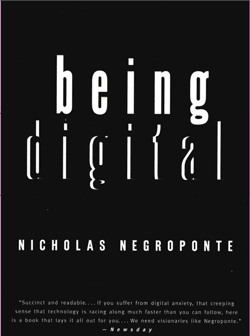Customer relationship management (CRM) is a process in which a business or other organization administers its interactions with customers, typically using data analysis to study large amounts of information.

Nicholas Negroponte is a Greek American architect. He is the founder and chairman Emeritus of Massachusetts Institute of Technology's Media Lab, and also founded the One Laptop per Child Association (OLPC). Negroponte is the author of the 1995 bestseller Being Digital translated into more than forty languages.
Personalized marketing, also known as one-to-one marketing or individual marketing, is a marketing strategy by which companies leverage data analysis and digital technology to deliver individualized messages and product offerings to current or prospective customers. Advancements in data collection methods, analytics, digital electronics, and digital economics, have enabled marketers to deploy more effective real-time and prolonged customer experience personalization tactics.
Mass customization makes use of flexible computer-aided systems to produce custom products. Such systems combine the low unit costs of mass production processes with the flexibility of individual customization.

Collaborative filtering (CF) is a technique used by recommender systems. Collaborative filtering has two senses, a narrow one and a more general one.
A recommender system, or a recommendation system, is a subclass of information filtering system that provides suggestions for items that are most pertinent to a particular user. Recommender systems are particularly useful when an individual needs to choose an item from a potentially overwhelming number of items that a service may offer.
Broadcatching is the downloading of digital content that has been made available over the Internet using RSS.
Email marketing is the act of sending a commercial message, typically to a group of people, using email. In its broadest sense, every email sent to a potential or current customer could be considered email marketing. It involves using email to send advertisements, request business, or solicit sales or donations. Email marketing strategies commonly seek to achieve one or more of three primary objectives: build loyalty, trust, or brand awareness. The term usually refers to sending email messages with the purpose of enhancing a merchant's relationship with current or previous customers, encouraging customer loyalty and repeat business, acquiring new customers or convincing current customers to purchase something immediately, and sharing third-party ads.
Personalization consists of tailoring a service or product to accommodate specific individuals. It is sometimes tied to groups or segments of individuals. Personalization involves collecting data on individuals, including web browsing history, web cookies, and location. Various organizations use personalization to improve customer satisfaction, digital sales conversion, marketing results, branding, and improved website metrics as well as for advertising. Personalization acts as a key element in social media and recommender systems. Personalization influences every sector of society — be it work, leisure, or citizenship.

In computing, a news aggregator, also termed a feed aggregator, content aggregator, feed reader, news reader, or simply an aggregator, is client software or a web application that aggregates digital content such as online newspapers, blogs, podcasts, and video blogs (vlogs) in one location for easy viewing. The updates distributed may include journal tables of contents, podcasts, videos, and news items.

Being Digital is a non-fiction book about digital technologies and their possible future by technology author, Nicholas Negroponte. It was originally published in January 1995 by Alfred A. Knopf.
Self-propaganda is the way in which people convince themselves of something regardless of the evidence against it. They will go over their side of the argument without considering the alternative arguments.
Google Personalized Search is a personalized search feature of Google Search, introduced in 2004. All searches on Google Search are associated with a browser cookie record. When a user performs a search, the search results are not only based on the relevance of each web page to the search term, but also on which websites the user visited through previous search results. This provides a more personalized experience that can increase the relevance of the search results for the particular user. Such filtering may also have side effects, such as the creation of a filter bubble.
Social commerce is a subset of electronic commerce that involves social media and online media that supports social interaction, and user contributions to assist online buying and selling of products and services.

In news media and social media, an echo chamber is an environment or ecosystem in which participants encounter beliefs that amplify or reinforce their preexisting beliefs by communication and repetition inside a closed system and insulated from rebuttal. An echo chamber circulates existing views without encountering opposing views, potentially resulting in confirmation bias. Echo chambers may increase social and political polarization and extremism. On social media, it is thought that echo chambers limit exposure to diverse perspectives, and favor and reinforce presupposed narratives and ideologies.
Personalized search is a web search tailored specifically to an individual's interests by incorporating information about the individual beyond the specific query provided. There are two general approaches to personalizing search results, involving modifying the user's query and re-ranking search results.

The Echo Nest is a music intelligence and data platform for developers and media companies. Owned by Spotify since 2014, the company is based in Somerville, MA. The Echo Nest began as a research spin-off from the MIT Media Lab to understand the audio and textual content of recorded music. Its creators intended it to perform music identification, recommendation, playlist creation, audio fingerprinting, and analysis for consumers and developers.

A filter bubble or ideological frame is a state of intellectual isolation that can result from personalized searches, recommendation systems, and algorithmic curation. The search results are based on information about the user, such as their location, past click-behavior, and search history. Consequently, users become separated from information that disagrees with their viewpoints, effectively isolating them in their own cultural or ideological bubbles, resulting in a limited and customized view of the world. The choices made by these algorithms are only sometimes transparent. Prime examples include Google Personalized Search results and Facebook's personalized news-stream.

Facebook's Feed, formerly known as the News Feed, is a web feed feature for the social network. The feed is the primary system through which users are exposed to content posted on the network. Feed highlights information that includes profile changes, upcoming events, and birthdays, among other updates. Using a proprietary method, Facebook selects a handful of updates to show users every time they visit their feed, out of an average of 2,000 updates they can potentially receive. Over two billion people use Facebook every month, making the network's Feed the most viewed and most influential aspect of the news industry. The feature, introduced in 2006, was renamed "Feed" in 2022.
A personalization management system (PMS) is an integrated software solution that enables users in an organization to manage and deliver personalized messages, campaigns, and interactive experiences to consumers across different communications channels and devices.







